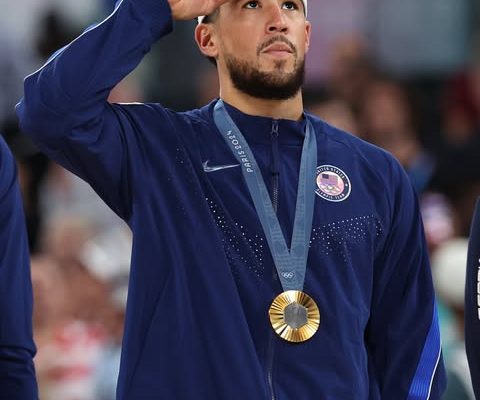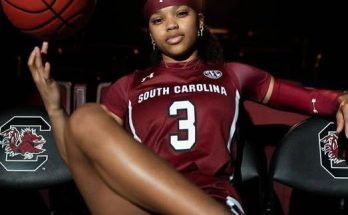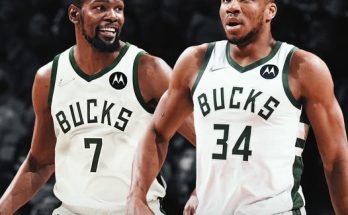One year ago, the basketball world watched as Devin Booker stood on the podium, gold medal in hand, a broad yet humble smile on his face, savoring the moment of becoming a two-time Olympic champion. The scene was a blend of personal triumph, national pride, and the culmination of years of hard work, sacrifice, and unrelenting competitive spirit. For Booker, this second gold medal was more than just a piece of hardware—it was a defining statement to the basketball world that his place among the game’s elite was not a matter of opinion but a matter of fact. The path to this achievement was paved with perseverance, high-stakes competition, and an unwavering focus on excellence, all of which made the moment resonate beyond the sport itself.
The story of Booker’s second Olympic gold was, in many ways, the story of his evolution as a player and as a leader. When he first joined Team USA for his Olympic debut, he was already an established NBA star with the Phoenix Suns. Known for his scoring prowess, smooth shooting mechanics, and ability to take over games, Booker was a player whose skillset translated seamlessly to the international stage. His first gold medal was a testament to his ability to adapt, to sacrifice personal statistics for team success, and to embrace a role that demanded both humility and intensity. However, the second time around, his role was different—not only was he a key contributor, but he was also one of the veterans on the squad, a player others looked to for leadership and composure in high-pressure moments.
The 2024 Olympic Games were a gauntlet of challenges for Team USA. International basketball had never been more competitive, with countries like France, Australia, Canada, and Spain boasting NBA-caliber rosters stacked with talent. The margin for error was razor-thin, and every game brought new challenges in the form of physical defense, strategic ball movement, and fierce national pride from opponents who saw beating the United States as the ultimate achievement. Booker thrived in this environment, balancing his trademark scoring bursts with defensive discipline, smart passing, and timely leadership. He was not merely a shooter—he was a complete player who understood the nuances of international play, where spacing, ball movement, and defensive positioning often determined the outcome more than sheer athleticism.
The medal run was not without its tense moments. In the semifinals, the United States faced a Canadian team featuring multiple NBA stars, including Shai Gilgeous-Alexander and Jamal Murray, who pushed the Americans to the brink. Booker’s performance in that game was the perfect encapsulation of his maturity as a player—he didn’t force shots, he picked his spots, and when the game hung in the balance, he hit a momentum-shifting three-pointer that swung the tide. It was the kind of play that didn’t just show his skill, but also his understanding of timing, rhythm, and leadership in the heat of competition.
The gold medal game was a classic clash of styles, pitting Team USA’s athleticism and depth against France’s tactical execution and size. For much of the contest, it was a back-and-forth battle. Booker, as he had done all tournament, found ways to impact the game beyond just scoring. He chased down loose balls, communicated constantly on defense, and kept his composure when France made runs. His scoring contributions were efficient, but his intangible impact—calming teammates, controlling pace, and knowing when to push the tempo—was what truly set him apart. When the final buzzer sounded and the scoreboard confirmed the United States as back-to-back Olympic champions, Booker’s reaction was telling. He wasn’t overly animated or boastful; he simply smiled, embraced his teammates, and soaked in the moment with a quiet satisfaction.
For Booker, the significance of this second gold medal extended beyond the Olympics themselves. It was a validation of his journey, from being a young sharpshooter at Kentucky to becoming one of the most respected all-around players in the NBA. His career had already been defined by his scoring achievements, All-Star appearances, and deep playoff runs with the Suns, but Olympic gold carried a different weight. It was an acknowledgment that he could excel in any environment, against the best in the world, while playing within a system that wasn’t built around him. That ability to adapt and still deliver at the highest level is what separates great players from the truly elite.
In the year since that golden moment, Booker’s profile in the basketball community has only grown. He’s been celebrated not just for his skills, but for his professionalism, his consistency, and his ability to rise to the occasion in the biggest moments. Younger players in the NBA and on the international stage often cite him as an example of how to prepare, how to compete, and how to balance personal excellence with team success. His approach to the game—focused, disciplined, and team-oriented—has become a blueprint for those who aspire to follow in his footsteps.
The legacy of his second gold medal also speaks to the enduring dominance of Team USA in basketball, even in an era where the global talent pool has never been deeper. While the competition is fiercer and the games more competitive, the Americans’ ability to produce champions like Booker ensures that they remain at the forefront of the sport. His role in maintaining that dominance is not lost on fans or analysts; it is a reminder that greatness is as much about consistency and preparation as it is about talent.
As the anniversary of that gold medal win arrived, fans and teammates alike reflected on just how pivotal Booker was to that run. Social media lit up with highlights from the tournament, tributes from fellow players, and messages from fans who saw his journey as inspiring. The moment was as much about celebrating his achievement as it was about acknowledging the values he embodies—resilience, dedication, and a relentless pursuit of improvement. In a sports world often obsessed with flashy moments and instant gratification, Booker’s career arc and his Olympic success offer a powerful counterpoint: greatness is built over time, through countless hours of preparation and the willingness to put the team first.
One year later, the image of Devin Booker holding that gold medal remains a powerful symbol. It’s a reminder of what it takes to stand at the top of the basketball world, not just once, but twice. It’s proof that hard work, adaptability, and unshakable focus can lead to repeated success at the highest level. And for Booker himself, it’s a milestone that will forever be part of his story—a chapter that cements his place among basketball’s elite and inspires the next generation to aim for their own golden moments.
If the first gold medal was the moment he proved he belonged, the second was the moment he proved he could lead. And for an athlete like Booker, who has built his career on proving people right about his potential, there’s perhaps no greater achievement than that. His second Olympic gold will forever stand as a testament to his skill, his leadership, and his enduring commitment to excellence, and it ensures that, no matter what the next chapters of his career hold, his name will always be spoken with the reverence reserved for the greats.



